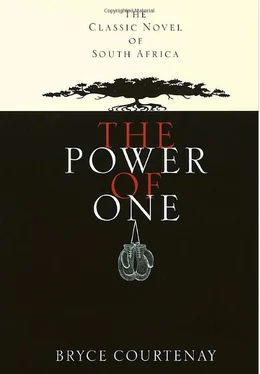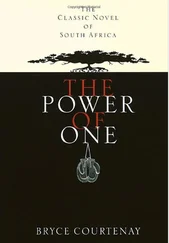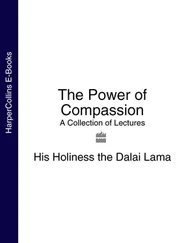Брайс Куртенэ - The Power of One
Здесь есть возможность читать онлайн «Брайс Куртенэ - The Power of One» весь текст электронной книги совершенно бесплатно (целиком полную версию без сокращений). В некоторых случаях можно слушать аудио, скачать через торрент в формате fb2 и присутствует краткое содержание. Жанр: Современная проза, на английском языке. Описание произведения, (предисловие) а так же отзывы посетителей доступны на портале библиотеки ЛибКат.
- Название:The Power of One
- Автор:
- Жанр:
- Год:неизвестен
- ISBN:нет данных
- Рейтинг книги:3 / 5. Голосов: 1
-
Избранное:Добавить в избранное
- Отзывы:
-
Ваша оценка:
- 60
- 1
- 2
- 3
- 4
- 5
The Power of One: краткое содержание, описание и аннотация
Предлагаем к чтению аннотацию, описание, краткое содержание или предисловие (зависит от того, что написал сам автор книги «The Power of One»). Если вы не нашли необходимую информацию о книге — напишите в комментариях, мы постараемся отыскать её.
The book is made to movie with the same name.
The Power of One — читать онлайн бесплатно полную книгу (весь текст) целиком
Ниже представлен текст книги, разбитый по страницам. Система сохранения места последней прочитанной страницы, позволяет с удобством читать онлайн бесплатно книгу «The Power of One», без необходимости каждый раз заново искать на чём Вы остановились. Поставьте закладку, и сможете в любой момент перейти на страницу, на которой закончили чтение.
Интервал:
Закладка:
Each week I received a letter from Doc, Mrs Boxall and Miss Bornstein. While I wrote home fairly regularly, I think my mother must have been too busy sewing to write very often. Sometimes on the bottom of Doc’s letters would appear two inky thumb prints under which Doc would write in his small neat hand, From Dee and Dum who ask who is washing your clothes and baking rusks for your coffee in the morning? Dee and Dum continued to make the sojourn to Doc’s cottage for the weekly clean-up and he had grown very fond of them. Doc’s letters were about the hills and his beloved cacti, and while I had continued my piano under the instruction of the school music master, he never mentioned music in his letters. I think Doc knew I was destined for other things. Mrs Boxall would write all the town gossip, and she said that the Assemblies of God had supplied two young missionaries who could speak four African languages between them to take on the prison letters. She was still in charge, determined that God would not be allowed to interfere with the perfectly lovely business of writing a letter to your loved ones. In one of her letters she had added that the people sadly missed King Georgie and that letter writing had fallen off a fair bit after I had left.
The Earl of Sandwich Fund had started to spread and Mrs Boxall was elected chairwoman of seven different groups which had started prison rehabilitation work among black prisoners in South Africa. Many of these early members of the Sandwich Fund were to become the leaders of the Black Sash movement, a movement among South African women which started in the mid fifties to protest against apartheid and injustice against the black people. It continues as one of the few voices of freedom coming out of this sad land; a voice muted from protest against a regime afraid to hear the just and anguished cries of the people.
Miss Bornstein was determined to develop my intellect and insisted on knowing in some detail exactly which books we were reading, maths we were doing and, in fact, everything. I had written to her about Hymie and she included him in her letters which would consist mostly of pages and pages of questions and discussion points. Finally she would always include in her weekly letter a chess move for each of us from old Mr Bornstein who in the six years we were at school we never managed to beat.
Hymie would groan loudly when the weekly letter arrived plump with questions. He’d hold his hands to the side of his face and rock in an exaggerated manner. ‘Oy veh!’ he’d say, imitating his granma, ‘the only reason I elected to come to this institution for Christian gentlemen was to get away from Jewish women, now I’m at fucking correspondence school with one!’ But Miss Bornstein had a way, even at long distance, of involving one’s pride and the interest she stimulated in her letters put Hymie and myself far ahead of anyone else in the A class at school.
Hymie was the first to use what became a famous expression throughout the school. We were in ‘Mango’ Cobett’s history class and Mango, an asinine man who taught with a very highbrow bias and was a dreadful snob, was talking about the Crimean War and the Charge of the Light Brigade. Mango carried the nickname because he had an oval-shaped head with fine blond hair which clung to his skull and a sharp blond goatee, the whole assemblage resembled a well-sucked mango pip. Though South African born, he was an avowed anglophile and spoke in a dewy-eyed manner about the bravery of Lord Cardigan in the Charge of the Light Brigade.
From the back of the class where we both sat Hymie interjected, ‘According to Miss Bornstein, he demonstrated a lamentable lack of control over the French, he also lacked common sense and a sense of responsibility to his men, sir.’
There was a stunned silence, Mango’s mouth was half open and he could hardly believe his ears.
‘According to Miss Bornstein, Lord Raglan was also completely out of his depth, in fact, a bumbling old fool,’ Hymie added.
Mango Cobett finally regained his voice. ‘According to whom, Levy?’
‘According to Miss Bornstein of the famous Jewish correspondence school, sir,’ I interjected. The classroom broke into an uproar.
‘Shut up! Everyone shut up at once!’ Mango Cobett yelled. The classroom quickly murmured down into silence. Both Hymie and myself were known as brains and Mango wasn’t game enough simply to punish us with a couple of hours’ detention without first asserting his superior historical perspective.
‘I was unaware that the Jews played a part in the Crimean War. I take it your Miss Bornstein is a history scholar of some distinction, perhaps a better source than The Invasion of the Crimea by A. W. Kinglake.’ He picked up one of the books which lay on the desk in front of him and held it high, squinting slightly as he read the spine. ‘William Blackwood and Sons, Edinburgh and London, 1864. I’d say that was from the horse’s mouth, wouldn’t you?’
‘More like the horse’s arse, sir,’ Hymie quipped, and the classroom broke up again.
Kinglake’s Invasion of the Crimea was one of the volumes my granpa had at home along with the complete works of Charles Dickens and I’d read both volumes of Kinglake’s account when I was eight. According to Miss Bornstein, Kinglake’s account was remarkable but she had also read the Russian and French accounts and now felt the official British version was heavily jingoistic and apt to blame the French and the Turks while allowing that Lord Raglan, the British Commander in Chief, though competent, was somewhat inexperienced and asserting Lord Cardigan to be a man of great sagacity and leadership skills. Miss Bornstein, Hymie and I had been conducting an involved correspondence on the very volumes Mango was quoting from.
‘According to Miss Bornstein, A. W. Kinglake was commissioned by the War Office to write the series, which was never a good start. The book has been republished several times and the 1864 version, slightly amended, was the fourth edition. More appeared after the first Boer War when the Transvaal had regained its independence, previously having been shamefully annexed by Britain after gold had fortuitously been discovered. The history was meant to remind the British of their recent glorious past so that they wouldn’t dwell too heavily on the trouncing they’d received from a handful of determined farmers who aimed straight and didn’t form into a square to fight. According to Miss Bornstein it is rather long on glory and somewhat short on the true facts. The volumes were republished again, just two years before the declaration of the second Boer War. They were, of course, ideally timed and put the British public in the mood for another territorial rape and pillage in the name of Queen and Empire.’ Hymie had exactly quoted a passage in one of Miss Bornstein’s letters, it was word perfect, even comma perfect.
Mango Cobett’s usually deathly pale face had flushed a dark red. ‘Are you challenging the integrity of one of the finest historians to come out of the British Isles, Levy?’
‘No, sir,’ Hymie said. ‘Miss Bornstein is.’ The class broke into spontaneous laughter again.
‘Shut up! Shut up!’ Mango yelled. ‘I’ve heard enough!’ The class settled down and a flushed Mango Cobett commenced to walk up and down the length of the classroom. ‘The Battle of Alma, the first in the Crimea, where the British took the Russian General Menshikov head on, Russians 9,000 dead, British 2,000! Those, gentlemen, are the facts.’
I jumped in. ‘According to Miss Bornstein, Lord Raglan lost control of the Battle of Alma almost from the moment it started. He set the frontal attack and then lost control while the French climbed the steep cliffs near the mouth of the river and outflanked Menshikov with few casualties.’
Читать дальшеИнтервал:
Закладка:
Похожие книги на «The Power of One»
Представляем Вашему вниманию похожие книги на «The Power of One» списком для выбора. Мы отобрали схожую по названию и смыслу литературу в надежде предоставить читателям больше вариантов отыскать новые, интересные, ещё непрочитанные произведения.
Обсуждение, отзывы о книге «The Power of One» и просто собственные мнения читателей. Оставьте ваши комментарии, напишите, что Вы думаете о произведении, его смысле или главных героях. Укажите что конкретно понравилось, а что нет, и почему Вы так считаете.












